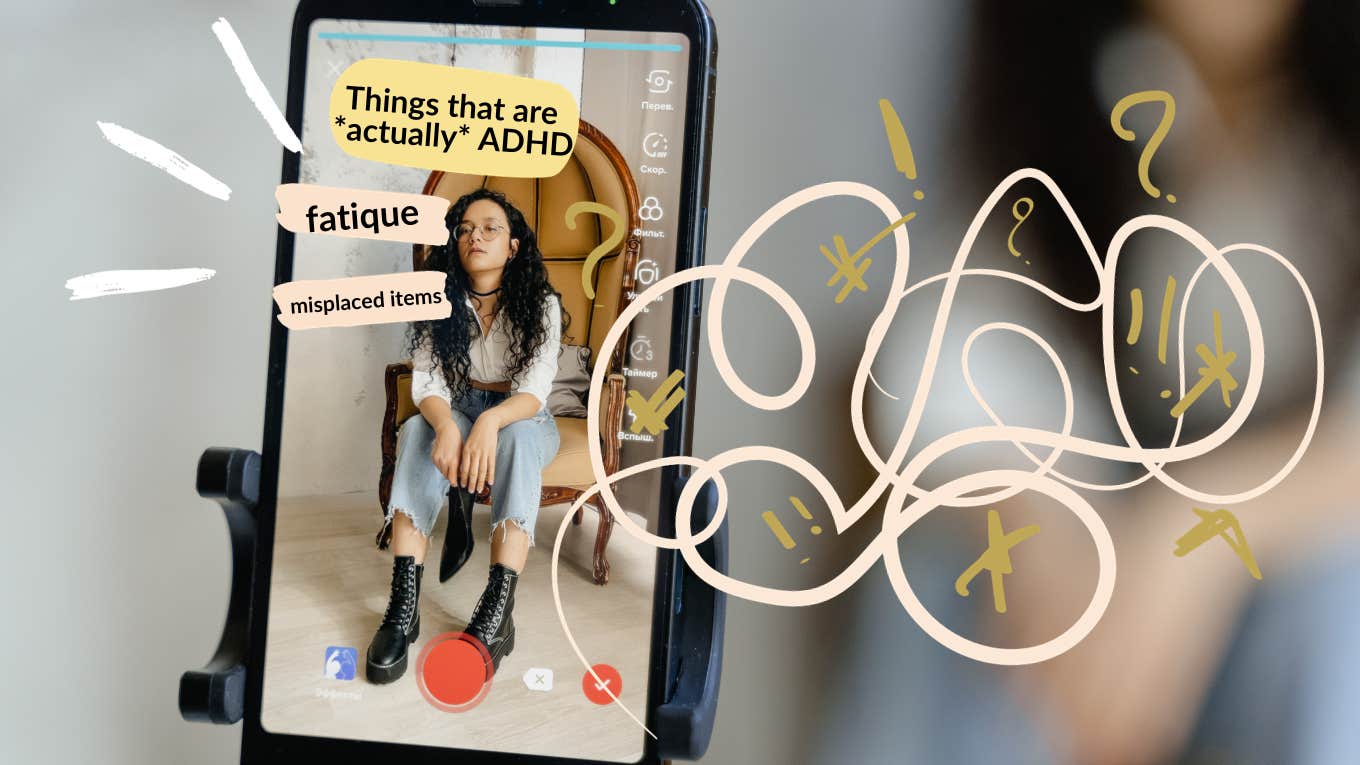Woman Calls Out 'ADHD Influencers' For Turning Everything Into Part Of A Mental Illness
There's an increasingly worrying trend happening right under our noses.
 Graphix, MART PRODUCTION / Canva
Graphix, MART PRODUCTION / Canva Thanks to the growing accessibility to the internet and the ability for anyone to create a platform for themselves, an increasingly worrying problem can be found on TikTok that stems from people who are quick to think that there’s something wrong with them when the truth is far from a self-diagnosis of mental illness.
The mysterious TikTok algorithm will continue to feed troublesome and misinformed videos simply because people are fulfilling their confirmation biases, but this creates a snowball effect in the way people on and offline view real mental illness and the power of self-diagnosing.
One woman called out 'ADHD influencers' for turning normal things into mental illness.
A woman named Joan Summers, creator and host of the Eating For Free podcast, penned a tweet in which she called out “ADHD influencers” and the effect that they seem to be having on people all over social media by specifically targeting a video from the account @letsrewire.
“At some point, we're gonna have to deal with these ‘adhd influencers’ before things get even weirder than this because.... the amount of likes and positive comments this has.... like TikTok is making people SICK!” she emotionally states her opinion on the matter.
Summers makes a great point because there’s a ton of misinformation running rampant on TikTok regarding the symptoms of mental illnesses like ADHD and ASD, as well as people trying to claim that normal, everyday things are somehow symptoms of mental illness.
These kinds of people will also make videos or statements like, “If you experience this, then you have ASD/ADHD,” when it couldn’t be farther from the truth and they are not medical professionals or capable of diagnosing strangers on the internet.
The video that Summers specifically refers to comes from the account @letsrewire, who claims that “neurotypical people don’t have to use any brain power to do things like shower, wash their face, brush their teeth… it happens automatically for them,” adding that “they also don’t hear any voices while doing it,” referring to the inner monologue that most people experience when processing thoughts inside of their own heads.
According to research done by Russell T. Hurlburt, there’s an approximation that 30-50% of people experience an inner monologue. However, many professionals would share that this number may in fact be higher, as it is a commonly experienced phenomenon.
Regardless of how common or uncommon it may be, there is no symptom of ADHD or ASD that would mean neurodivergent people have this thing that neurotypical people don’t — they are not tied to one another in the slightest.
“I found out last month that no one else — like, neurotypical people don’t have an inner monologue,” she claims. “I still can’t believe this is true,” she adds, touching on an instinct that she may want to look deeper into.
Trying to diagnose everything as a mental illness removes the power of self-diagnosis and the perception of real mental illness.
Self-diagnosis can be an incredibly powerful tool that allows people to gain a deeper understanding of the way their brains are structured, why they might perform actions in a certain way or differently than others around them and, more simply, helps people feel like they aren’t alone.
However, it’s important for people who are attempting to self-diagnose to do extensive research on the symptoms and illnesses they’re assessing, as well as understand that a self-diagnosis cannot be used in place of a professional, medical diagnosis.
“When you wrongfully self-diagnose your symptoms, you may attempt to cure your condition through your diet, over-the-counter medications, or other methods, potentially complicating your true condition,” writes Dr. Todd Thatcher of the Highland Springs Clinic. “If you address a specific symptom while ignoring the underlying source of your symptoms, your initial mental illness may worsen.”
Self-diagnosis should be treated as a step into seeking out professional help, as outlined by Dr. Thatcher in an article that discusses the potential dangers of self-diagnosis. “If you do seek answers online and feel as though you have uncovered a potential diagnosis,” he says, “speak to a professional to confirm your findings.”
This increasingly common trend can also be problematic when it comes to actually identifying mental illness or the public’s perception of what these mental illnesses truly are.
One person on Twitter shared, “Nothing has made me more ashamed of having ADHD than the ADHD [TikTok] influencers who push the idea that we can't grocery shop or shower or tie our own shoes.”
It’s not as simple as not being able to focus on something or losing your train of thought — these are serious mental illnesses that could be debilitating for those who struggle with them. These influencers are preying on people who seek to confirm their own biases or are truly struggling with concepts they know very little about without worrying about how dangerous it is to spread misinformation.
Isaac Serna-Diez is an Assistant Editor for YourTango who focuses on entertainment and news, social justice, and politics.

